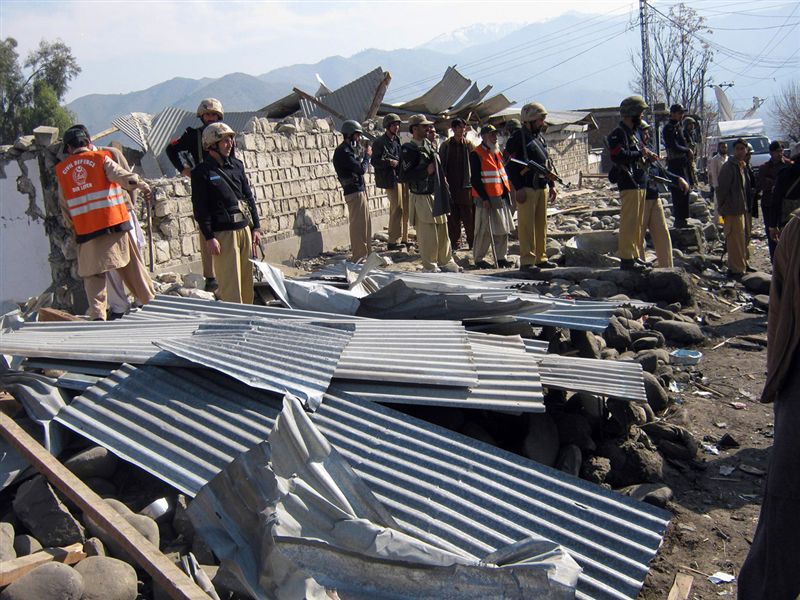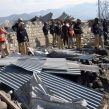
Pakistani Taliban Display Effectiveness of their Intelligence Network with Attack on U.S. Special Forces
Publication: Terrorism Monitor Volume: 8 Issue: 7
By:

Following the Afghan Taliban intelligence coup that led to the late December suicide-bombing at an American base in Khost province that killed seven CIA agents, Pakistan’s Taliban have apparently scored an intelligence success of their own, exposing a secret U.S. operation in the North-West Frontier Province (NWFP) by killing three American Special Forces operatives in a carefully targeted suicide car-bombing. The attack took place outside the re-opening of a girls’ school in Shahi Koto, an area of the Lower Dir district of the NWFP. The Pakistani military claimed to have cleared Upper and Lower Dir of militants in the summer of 2009.
The suicide bomber appears to have waited for the paramilitary Frontier Corps (FC) vehicle carrying the Americans before driving his car alongside and detonating a powerful bomb of 50 to 60 kilograms of explosives. Other than the three Americans, five schoolgirls and an FC soldier were killed. Dozens of schoolgirls were wounded after being trapped under the rubble of the demolished school building (AFP, February 4). The girls’ school was one of dozens destroyed by TTP forces under the command of Maulana Fazlullah last year. It was rebuilt with the assistance of the U.S. Agency for International Development (USAID). Investigators from Pakistan’s security services claimed the suicide bomber was an Uzbek who was part of a group of militants fleeing from military operations in Bajaur (The News [Islamabad], February 8; see also Terrorism Monitor, February 11).
The suicide bombing was carried out with deliberation; the attacker appeared to know when the convoy was destined to arrive and which of the five vehicles contained the Americans. Police are investigating whether the attacker had inside information (Daily Times [Lahore], February 5).
Besides proving their ability to strike targets even in areas “cleared” of insurgents by the Pakistani military, those behind the bombing also sent a powerful signal to the local community that their children will not be safe at schools which are not authorized by the TTP. One leading Pakistani daily expressed astonishment that TTP insurgents would take revenge for the death of TTP leader Hakimullah Mahsud by a cruel attack on a crowded girls’ school. “Is this the bravado that the Mahsuds are known for?” (Business Recorder [Karachi], February 9).
A spokesman for the Frontier Corps initially claimed the dead foreigners were “working for an NGO” and were from “the international community” (The Nation, February 9). An editorial in a leading Pakistani daily described the initial confusion that sparked debate in Pakistan over the identity of the deceased and the nature of their mission in Pakistan. “Three foreign nationals were reported killed. Initially they were said to be ‘foreign journalists,’ then they became aid workers perhaps working with USAID but by mid-afternoon they had become ‘U.S. army personnel’ and by late afternoon as per a statement by the U.S. embassy in Islamabad they were ‘trainers’ working with the Frontier Corps” (The News, February 4).
Despite clumsy attempts to conceal the identity and mission of the dead Americans, the bombing provided conclusive evidence of an American military presence in Pakistan that had been concealed from the public, the political opposition and the media. A U.S. embassy official in Islamabad denied the mission was ever covert. "It’s not a secret program by any means. The F.C. is operational in those areas. They’ve requested training and assistance and we’re providing them… Do we highlight it actively? No. But it’s not that we don’t talk about it" (AFP, February 4). Eventually embassy officials revealed there were roughly 200 U.S. troops in Pakistan on a mission to provide security assistance and training in combat and intelligence methods to FC personnel. The training program had started in the summer of 2008 and was accompanied by shipments of useful supplies generally missing from FC inventories: night scopes for rifles, night vision equipment, body armor, medical supplies, communications equipment, etc.(AFP, February 4).
Pakistan’s Minister for Information and Broadcasting, Qamar Zaman Kaira, said the government has never denied the presence of American troops in side Pakistan, and that their sole purpose was to upgrade the training of forces on the northwest frontier that were not properly equipped to tackle terrorism (Associated Press of Pakistan, February 5).
The bombing and the initial confusion over the identity of the victims immediately fed into the popular belief in Pakistan that large numbers of private military contractors from American firm Xe Services LLC (still almost exclusively known in Pakistan by its former name – Blackwater Worldwide) are conducting covert operations in Pakistan, including many of the bombings that have been blamed on the local Taliban. In a claim of responsibility made shortly after the blast, TTP spokesman Azam Tariq stated, “The Americans killed were members of the Blackwater group. We know they are responsible for bomb blasts in Peshawar and other Pakistani cities” (The Nation [Islamabad], February 3). Richard Holbrooke, the U.S. Special Representative for Afghanistan and Pakistan, stated that the dead and wounded servicemen were members of the regular armed forces and not contractors from Xe Services, saying Taliban claims to the contrary were predictable. “They’re certain to say that. That’s what they do. They’re adept at propaganda and distortion” (Dawn [Karachi], February 5). Two prominent ex-leaders of the Pakistani military and intelligence services, former chief of army staff General (Ret’d.) Aslam Beg and former military intelligence director Lieutenant General (Ret’d.) Amjad Shoaib, inflamed the controversy by insisting the dead servicemen were actually members of Blackwater’s “Special Operational Group” (Jang [Rawalpindi], February 7; PakObserver, February 5).
Another Taliban commander known as Hafizullah told the press that the attack specifically targeted the U.S. Special Forces soldiers after Pakistani security officials claimed the true target was F.C. Colonel Nadeem Mirza, who suffered injuries in the attack. Hafizullah also hinted that the TTP had prior information about the formation and timing of the convoy (The News, February 8).
The former security chief in Pakistan’s tribal agencies, Brigadier (Ret’d.) Mehmood Shah, suggested the information may have come from inside the Frontier Corps, which is recruited from the same tribal population from which the Taliban are drawn. Shah remarked that the paramilitary F.C. was not as well disciplined as the regular forces and that the rank and file could not be trusted with secret information (The News, February 8).
Pakistani defense analyst Ikram Sehgal noted that the F.C. remains a poor cousin to the Pakistani regular forces deployed along the eastern frontier with India. “Locally recruited Frontier Corps troops are lightly armed, good only in their policing role, dealing with tribal rivalry and border smuggling, rather than engaging in military operations combating well-armed and experienced guerrillas” (The News, February 11).
An Islamabad daily usually well-informed on military issues said their sources indicated the Special Forces unit was involved in training a 1,000 man F.C. commando force to carry out operations against al-Qaeda and the Taliban in the difficult terrain of the North-West Frontier. The U.S.-funded program was not publicized to avoid a public backlash in Pakistan. “In the beginning, the American military trainers confined themselves to training compounds due to security concerns in Pakistan. However, they had now started accompanying Pakistani troops on special guerrilla operations against the Taliban and al-Qaeda militants, eventually leading to the Wednesday incident in Lower Dir which shares a border with Afghanistan and with the restive Swat district…” (The News, February 4).
The Americans were the first U.S. troops killed in Pakistan since an Air Force Major and a Navy cryptologist were killed in the September 20, 2008 TTP bombing of the Marriot hotel in Islamabad.





